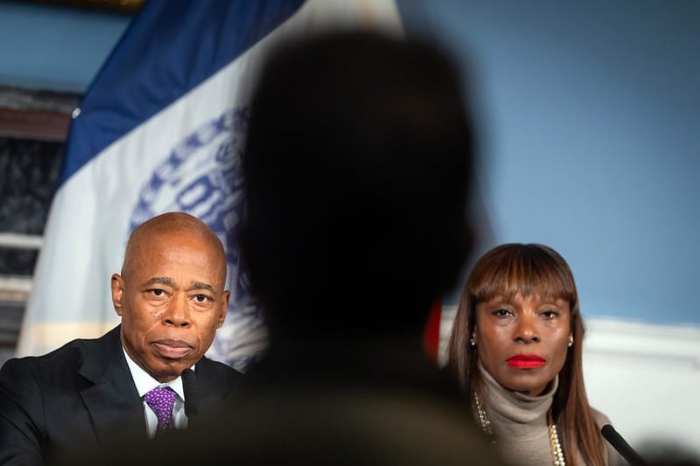BY SCOTT STIFFLER | We’ve followed them on the campaign trail. We’ve read their website bios and their policy papers. We’ve watched the debates, hosted a few of our own and welcomed them to our round table for lengthy roundtable discussions.
Under the stewardship of publisher Jennifer Goodstein, NYC Community Media — comprised of Chelsea Now, The Villager, The East Villager, Downtown Express and Gay City News — has been meeting with candidates for city council, borough president and mayor, in anticipation of choosing our endorsements (see pages 8 and 9 of this issue). Each editor asked questions of particular interest to their readership — which, for Chelsea Now, meant exploring possible reforms to the Uniform Land Use Review Procedure (ULURP) process.
When a developer’s ULURP application is approved by the City Planning Commission (CPC), CB4 weighs in — then the borough president has 30 days to respond, and the CPC, 60 days after that — at which point, it goes before the City Council, whose final vote is subject only to a rarely invoked mayoral override.
Everyone we spoke with voiced support for reforming the process. Candidates differed, however, in the extent to which they’d grant something more than advisory power to community boards and the borough president. Our discussions often touched upon embedding community benefits such as schools and affordable housing into the ULURP process. The below is not a complete collection of all the candidates we interviewed, but it does represent the major points of view and proposals.
—————————————-
JULIE MENIN
Former Community Board 1 Chair and candidate for borough president
I put out a policy paper a couple months ago on the need to reform ULURP. When I chaired Community Board 1, I testified in front of the charter revision commission and submitted testimony…Other cities are doing this so much better. They have clear, mandated standards that say if you are going to have development, we are going to insist that the project provides enough new school seats to the new residents that are part of the project. Similarly, other cities require a mandated percentage of set-aside for affordable housing on site.
If you look at the larger land use ULURP projects — Columbia University expansion, NYU expansion, Chelsea Market expansion, South Street Seaport — you have widely differing results. And so sometimes the giveback might be a school, sometimes it might be real affordable housing. It’s a complete free-for-all without enough clear, discernible standards, and that does not benefit the community.
—————————————-
JESSICA LAPPIN
District 5 City Councilmember and candidate for borough president
The borough president should play a central role” in shepherding ULURP applications while they’re at the community board level, before it reaches the BP’s desk…Whatever it is, they need to be heard through the process, I think the borough president should be helping make sure that happens. That’s something that I don’t think [current borough president] Scott [Stringer] has done as much as I would do.
—————————————-
BILL THOMPSON
Former City Comptroller and mayoral candidate
We have to focus and build affordable housing — low, moderate and middle income housing across the city of New York. It is less a city of opportunity if people can’t afford to live here, and you are seeing that occur right now. In places where the city controls land, we should be working with residents of the hosing authority to talk about doing some things on the grounds, at different housing authority developments…If I’m starting to talk about market [rate affordable housing], then my conversation shouldn’t be 80/20. It should start to become 50/30/20 — that 30 being middle income.
I dislike the part of the ULURP process that gets into the city council and each city council person appears to be negotiation these days a community benefit agreement. I think we need to make that more of a standardized type of situation.
—————————————-
CHRISTINE QUINN
City Council Speaker and mayoral candidate
As Speaker, I proposed a number of ideas for the Charter Revision Commission on how to improve the ULURP process that I would work to get implemented as mayor. They included changes to the pre-certification process that would allow for more community input, by requiring City Planning to meet with the Community Board or Borough President within 30 days of sending them required materials.
—————————————-
BILL DE BLASIO
Public Advocate and mayoral candidate
We’ve all been to this movie. The front end is where the action is. It can be one year, two years, four years of the process leading up to this occasion. And then the ULURP process is actually fairly tightly defined in its time range, but inevitably the final deals are cut at like 11:59pm, and I think they’re actually not really good deals in a lot of cases, meaning I think they are in the heat of battle, and the community doesn’t get enough.
What I have proposed is to speed up and define the pre-certification timeline. I believe in mandatory inclusionary zoning, and that’s part of my affordable housing plan, so I want the affordable housing component guaranteed, legally guaranteed. Given what’s happening with real estate values, no, they won’t walk away, they’ll start competing. If one big real estate firm passes on a important property, someone else is going to swoop in on the property and say okay, I’ll give you the affordable housing, because I want to get my hands on that property, and the profit that goes with it.
—————————————-
COREY JOHNSON
Community Board 4 Chair and District 3 City Council candidate
The ULURP process is, in many ways — I don’t know if “broken” is the right word, but it’s need of major reform. And I think that one of the [city] council’s major charter-mandated responsibilities and powers is having final action over any land use matter. In other cities, like San Francisco and Seattle, they have mandatory set-asides. I think we need look at charter revision, and changing the way land use is done in New York City.
There are a few major structural thing that I think need to change right now. The community boards and the borough president have only advisory roles. I think that the community board and the borough president should be given binding opinions — that what they say needs to actually stand through the rest of the process…There would need to be a charter revision…I think there’s a major issue with the pre-certification phase at the Department of City Planning. So that by the time the application comes to the community board, the developer already feels like they have worked things out and have figured out what city planning ultimately wants.
The other part of it is, that there is a housing crisis going on in New York City right now, a major housing crisis. Developers only build more affordable housing if they’re incentivized, they don’t do it out of the goodness of their hearts — they do it because they think it’s going to be beneficial to them.
—————————————-
YETTA KURLAND
Civil Rights Attorney and District 3 City Council candidate
I think it [the Chelsea Market ULURP process] typifies some of the problems that we’re seeing. I am not tied to real estate interests. I come from a very public-interested background, and I can be an outspoken advocate on behalf of the community. I think what we’re seeing with Chelsea Market is a problem that we often see in terms of ULURPs — and in terms of the fight for affordable housing. The question really becomes whether or not the units actually develop.
It’s not that real estate unto itself is a bad thing — it’s that the problem right now, what the community gets out of the exchange is not a fair trade. Chelsea Market was a good example of that. We often are promised affordable housing…but how much of it really will be affordable? And I think that’s why we need somebody who is going to be unafraid, even if there’s backlash, even if we ruffle a few feathers — respectfully, but effectively — stand up to those forces and really see it through.
The community board having something more than advisory powers? I’m open to that as an idea.
I’m a tenant rights attorney. I’ve represented dozens of people who are in rent controlled or rent stabilized apartments, who are single resident occupants whose predatory landlords were trying to evict them. So I think one of the things that we do is we preserve the affordable housing stock that exists now. And again, I think that there has to be a balance between private real estate interests and public government roles…I don’t believe real estate developers when they tell us that it’s too expensive to build affordable housing. And it’s not that we don’t want real estate developers to get really rich, they can get really rich. But I think there is a way to do that that doesn’t displace our community.





































